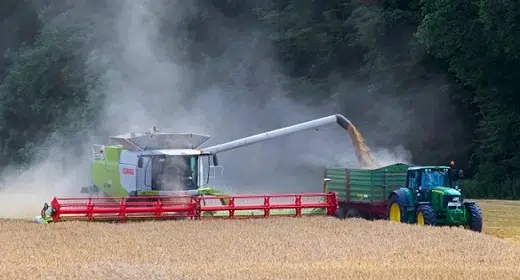by John Fialka: Department of Energy researchers say gasoline might have to be substituted with biofuels to ensure that climate targets are achieved…
The U.S. Department of Energy released the results of a six-year initiative that provides a national road map for alternative ways to reduce greenhouse gas emissions from the transportation sector as electric vehicles slowly phase in.
The report, called the “Co-Optimization of Fuels & Engines,” or “Co-Optima,” involved 140 experts including 100 from nine DOE laboratories and an additional 40 experts from industry and universities.
It concluded that a combination of lower-carbon fuels made from agricultural and forestry wastes, livestock manure, algae and waste fat, oil, and grease could be a substitute for gasoline and diesel to help fuel the nation’s 270 million cars and trucks, while EVs slowly phase in over the next 15 years.
“The project changes the way biofuels researchers in the labs, academia and industry think about fuels, in that it points the way to fuels with outstanding rather than average or even bad properties for end use,” said Robert McCormick, a principal investigator on the project.
The introduction of new cleaner fuels, predicted to cost less than $4 a gallon, along with some new engine designs, could help cut carbon emissions by as much as 50 percent “for all road vehicles” and speed up the nation’s planned transition to becoming a net-zero emitter, the report says.
The researchers didn’t pick the final fuels to be used, after studying more 1,000 of them using computer models and simulations, but they asserted that the findings will not shock automotive and petroleum industries.
They were among the “external stakeholders” who “helped us gauge potential research directions,” the report says.
The researchers say their plan is a “bridge” to future transportation fuel and auto markets and that it could improve the economy of cars by 10-20 percent and cut pollution from trucks by as much as 99 percent.
“Our goal is to catalyze commercialization of these solutions,” the report says, pointing out that the results could also cap escalating fuel costs and help clear the air in poorer neighborhoods.
The impacts of the changes, if and when they are implemented, would touch almost everyone. U.S. passenger vehicles and pickup trucks move people and goods about 3 trillion miles in one year, consuming 57 percent of the energy used for transportation. They also generate 58 percent of the CO2 and other greenhouse gases related to transportation.
Medium- and heavy-duty trucks haul 10 billion tons of cargo across the U.S. annually and emit 24 percent of all transportation-related greenhouse gas emissions.
The petroleum industry already uses ethanol made from corn as a gasoline additive. The report’s lengthy list of future “biofuels” that could be used by cars begins with corn stalks, wood wastes, municipal solid wastes and other cheap feedstocks. Seven of the fuels it investigated could be produced for $4 per gallon or less.
The researchers said they found 13 sustainable diesel fuels that have the potential to decrease greenhouse gas emissions from trucks by more than 60 percent and reduce other pollutants.
“These findings point the way for automakers, fuel producers, and other transportation sector decision makers to bring these new bioblendstocks and vehicle technologies to market,” the report says.
“The contest for new fuels and vehicle technologies has changed significantly since the Co-Optima initiative kicked off 6 years ago,” it adds, pointing out that “climate change is accelerating, increasing the urgency to drastically reduce the greenhouse gas emissions responsible for global warming.”
It adds that “new knowledge and pollution-reducing fuels and engine technologies developed during the study” for trucks “may also help reduce pollution from ships, railroad trains, off-road vehicles, and airplane engines.”
Researchers, using DOE’s state-of-the-art computers, according to the report, “developed a wide range of robust, validated tools to capture fuel-engine interactions with greater accuracy, improve the efficiency of predictions and reduce computation time.”
Using computers, rather than actual testing in engines, it explains, “make it possible to evaluate an unprecedented number of fuel blends in days, rather than months.”
























































